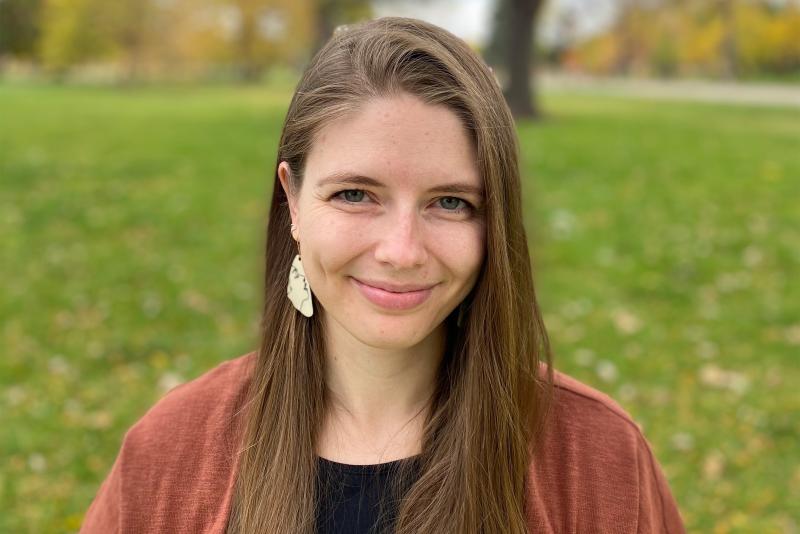Improving End-of-Life Care
PhD graduate Pilar Ingle is working to address root causes of homelessness and health inequities

The Denver metro area will record a grim milestone in 2023: More unhoused people have died in the city this year than ever before. Deaths of unhoused individuals in Denver are up more than 50% since 2022, and the number dying on the streets has increased every year for the past seven.
Recent University of Denver Graduate School of Social Work doctoral program graduate Pilar Ingle, PhD ’23, is working to change that. Her research focuses on systemic and structural drivers of inequity and the intersections of poverty and health care for individuals with chronic and life-limiting illnesses.
“Compared to the stably housed population, unhoused individuals have higher rates of chronic and serious illness, die at much younger ages, and are more likely to die in the hospital or in unsupportive settings, such as on the streets,” Ingle wrote in a recent Elevated Denver blog post.
For her dissertation, “Provider Perspectives on Access to Palliative and End-of-Life Care for Older Adults Experiencing Homelessness: A Mixed-Methods Study,” Ingle surveyed and interviewed Colorado health care and social service providers to learn about their experiences working with unhoused people with life-limiting or terminal illnesses. “I wanted to understand more about the structural influences that were driving how palliative and end-of-life care needs are addressed, or not addressed, for unhoused individuals in Colorado,” Ingle says.
Providers noted the lack of resources to address the health care needs of unhoused people in general. There are even fewer options for those needing palliative or hospice care. For instance, the Rocky Mountain Refuge provides shelter for unhoused individuals with terminal illnesses but is the only shelter of its kind in Colorado and one of only four nationwide. Due to finance limitations, however, the organization had to suspend caregiving and stop taking new residents in August 2023.
Participants in Ingle’s study most often identified lack of stable housing or informal care, mental illness, substance use, complex care needs and lack of community resources as challenges in providing care to people experiencing homelessness.
One participant shared, “The highest altitude part of my brain always goes back to classism … It’s just another way people without resources are getting harmed in this country. [Unhoused people] don’t even have the ability to die with dignity, and I just can’t think of any other fundamental thing everyone should agree on other than that.”
“Through my conversations with different folks about this issue, I really came to understand that equitable palliative and end-of-life care really aren’t possible unless the conditions in which people live throughout their lives are also equitable and just, which means ultimately acknowledging and addressing the root causes of poverty, homelessness and health inequities,” Ingle says. “At the same time, people are dying in pain and in the streets, so we do need more immediate solutions to make sure that our unhoused neighbors are able to receive dignifying care at their end of life.”
Because there are so many complex, urgent issues related to homelessness, it can be difficult to prioritize palliative and end-of-life care, Ingle notes. “At the same time, we don’t do a great job as a society talking about death and dying, and when issues of homelessness are added to the mix, the conversation becomes even harder,” she says. “Raising awareness about end-of-life issues for our unhoused neighbors, addressing stigma and elevating the work of organizations trying to address the gap in care is really important in this work moving forward.”
It’s important to note that systems aren’t just failing unhoused individuals. Providers are suffering too, Ingle notes. Providers regularly face ethical challenges such as how to address needs without resources to do so. When providers aren’t given the support or tools to meet needs, she says, they can experience moral injury. “We’re failing unhoused individuals, and we’re failing providers,” Ingle notes.
Ingle asked participants to imagine a world with enough resources and describe what that would look like. Their feedback highlighted potential pathways to improve palliative and end-of-life care for unhoused individuals through person-centered care partnered with organizational support and funding, as well as transformations in societal narratives and practices of community care.
Ingle continues to build relationships with community organizations to understand how she can apply her social work research skillset to further illuminate the end-of-life and aging needs among unhoused people. And as a postdoctoral researcher with the Paul Freeman Financial Security Program at the University of Denver Knoebel Institute for Healthy Aging, her work supports the financial well-being of older adults.
In general, Ingle says, a lot of the work being done to promote healthy aging and well-being is often most relevant to more economically privileged older adults and families. “I am excited to work with an institute that recognizes the need to also address structural issues that impact aging and well-being for older adults, including housing insecurity and homelessness,” she adds.
“It’s hard to prioritize end-of-life care when there are so many different things making it hard to survive as someone experiencing homelessness, and it’s at the bottom of the list of needs people are experiencing on a daily basis,” Ingle says. “We all need to agree to care about it more.”




